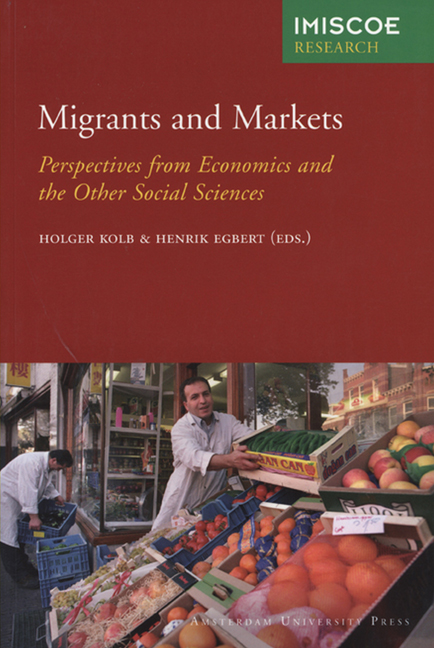Book contents
- Frontmatter
- Contents
- Introduction: Migrants and Markets: Perspectives from Economics and the Other Social Sciences
- The Impact of Immigration on the Labour Market: A Survey
- Investigating the Economic Impact of Immigration on the Host Country: The Case of Norway
- The Exit Option of Labour Migration from East to West Germany: Individual and Contextual Determinants of Unemployed Workers’ Geographic Mobility
- How Recent Amendments in German Immigration Law Affect Decisions: The Case of Polish Doctors
- Educational Selectivity and Labour Market Attainment of Jewish Immigrants from the Former Soviet Union in Israel and Germany in the 1990s
- States as Clubs? The Political Economy of State Membership
- Chinese Student Migration in Europe: A Migration That Nobody Objects To?
- Assessing Interdependencies between Sector Structures and Labour Migration: A Comparative Study of the British and the German Health Sectors
- Workers’ Remittances and International Risk Sharing
- Skills and Remittances: The Case of Afghan, Egyptian and Serbian Immigrants in Germany
- The Impact of Migration on Foreign Trade in Bolivia
- List of Contributors
- Other IMISCOE Titles
Assessing Interdependencies between Sector Structures and Labour Migration: A Comparative Study of the British and the German Health Sectors
Published online by Cambridge University Press: 02 February 2021
- Frontmatter
- Contents
- Introduction: Migrants and Markets: Perspectives from Economics and the Other Social Sciences
- The Impact of Immigration on the Labour Market: A Survey
- Investigating the Economic Impact of Immigration on the Host Country: The Case of Norway
- The Exit Option of Labour Migration from East to West Germany: Individual and Contextual Determinants of Unemployed Workers’ Geographic Mobility
- How Recent Amendments in German Immigration Law Affect Decisions: The Case of Polish Doctors
- Educational Selectivity and Labour Market Attainment of Jewish Immigrants from the Former Soviet Union in Israel and Germany in the 1990s
- States as Clubs? The Political Economy of State Membership
- Chinese Student Migration in Europe: A Migration That Nobody Objects To?
- Assessing Interdependencies between Sector Structures and Labour Migration: A Comparative Study of the British and the German Health Sectors
- Workers’ Remittances and International Risk Sharing
- Skills and Remittances: The Case of Afghan, Egyptian and Serbian Immigrants in Germany
- The Impact of Migration on Foreign Trade in Bolivia
- List of Contributors
- Other IMISCOE Titles
Summary
Labour migration in the British and German health sectors: challenging the demographic argument
Among all the European health and care sectors, the United Kingdom's has experienced without doubt the largest scale overseas recruitment in recent years, and forms a particularly stark contrast to the German health and care sector, which has experienced no significant recruitment of foreign health professionals for decades. In 2003, almost one-third of all doctors employed by the national health service (NHS) had acquired their qualification outside the UK, and in 2001, the number of foreign nurses registering with the Nursing and Midwifery Council exceeded the number of British nurses for the first time. While the British NHS has long employed foreign doctors, nurses and other kinds of therapists, their proportion increased gradually during the 1990s and sharply around the turn of the millennium. Although labour shortages and the occasional use of international recruitment can be observed in Germany since about 2002, figures are fairly diminutive in comparison to the British case. Furthermore the relevant actors seem to be much less inclined to consider international recruitment as an appropriate strategy.
The German and the British cases seem to represent only the two extremes of a wide array of recruitment practices in European health and care sectors. The different use and assessment of international recruitment are puzzling if we take into account an assumption that implicitly underpins most research on the migration of health professionals: ageing societies develop an increasing demand for health and care services (see, e.g. Forcier et al. 2004: 1; Ray et al. 2005). This demand cannot always be met by a ‘home-grown’ workforce in the short and medium term mainly due to the length of training. Thus the option of international recruitment emerges. Furthermore, it can at least be suspected that states might be inclined to attract highly skilled medical staff from abroad for economic reasons since training costs for doctors are particularly high.
Since most western industrial countries face similar demographic problems the migration of health and care professionals has become a matter of increasing concern for most OECD countries as well as for developing source countries which are at risk of suffering from a ‘brain drain’ of skilled personnel.
- Type
- Chapter
- Information
- Migrants and MarketsPerspectives from Economics and the Other Social Sciences, pp. 168 - 188Publisher: Amsterdam University PressPrint publication year: 2008



